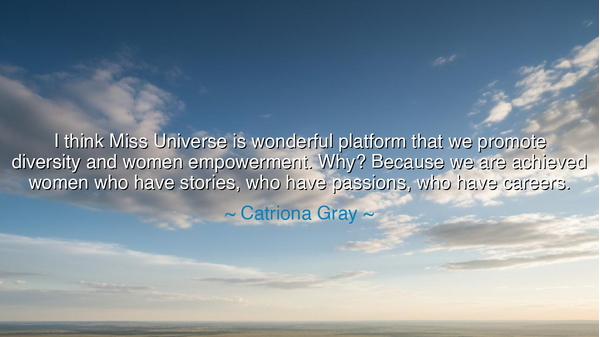
I think Miss Universe is wonderful platform that we promote
I think Miss Universe is wonderful platform that we promote diversity and women empowerment. Why? Because we are achieved women who have stories, who have passions, who have careers.






O children of the future, hear the words of Catriona Gray, who, with grace and wisdom, speaks of the sacred platform that is Miss Universe. "I think Miss Universe is a wonderful platform that we promote diversity and women empowerment," she declares. In these words, she reveals the profound power of such stages—where women from all corners of the world rise, not as mere figures of beauty, but as beacons of strength, with stories, passions, and careers that reflect the richness of their experiences. It is not just a contest of appearances, but a celebration of the achievement of women who have triumphed over adversity, who have created and nurtured, who have built their own legacies.
In the ancient days, goddesses such as Athena, Isis, and Artemis were revered not only for their beauty, but for their wisdom, their courage, and their power to shape the world around them. These divine figures were not defined by their outward appearance, but by their strength, their creativity, and their capacity to influence the lives of those who followed them. Just as Catriona Gray now honors the diverse strengths of women, so too did the ancient world honor the myriad forms of power that women held, each unique, each contributing to the collective whole.
Consider the story of Queen Cleopatra, who ruled Egypt not just with beauty, but with the mind of a diplomat, a strategist, and a leader. Her legacy is not solely defined by her image, but by the choices she made, the alliances she forged, and the future she secured for her people. Catriona Gray, in her wisdom, understands that Miss Universe is not about creating a singular, limited idea of a woman, but about celebrating the diversity of women—each of us possessing unique stories and dreams. Just as Cleopatra had her own story, so too do the women who stand in the spotlight of the modern world.
Yet, let us not forget the power of women who are often unseen—the ones whose names are not written in the books of history but whose impact is felt in the quiet resilience of everyday life. The mothers, the teachers, the scientists—women who have shaped the future not by being on stage, but by making sacrifices, by building families, by creating communities. These women, though they may not wear crowns, are no less empowered. The platform that Catriona Gray speaks of gives voice to those whose stories often remain hidden in the shadows, giving them the courage to rise and be heard.
O children, take this wisdom to heart. The true measure of a woman’s power lies not in her outward appearance, nor in the titles she holds, but in the strength of her spirit, the depth of her passion, and the legacy she creates. Whether on the grand stage of Miss Universe or in the quiet corners of the world, every woman has a story to tell. And in the sharing of those stories, in the promotion of diversity and empowerment, we find the strength to shape a future where all women—of every shape, color, and story—can rise to their fullest potential.






KCThach thi kim cuong
Gray’s perspective on Miss Universe highlights a positive shift toward recognizing more than just physical beauty. But does this empowerment truly extend to all women, or does it still cater to certain ideals that limit representation? Could there be room for more platforms that celebrate women in diverse roles—outside of beauty pageants—where achievements in education, science, or leadership are at the forefront?
TLTrang Le
I appreciate Catriona Gray’s take on Miss Universe as a celebration of women’s stories, passions, and careers. But does promoting empowerment through beauty pageants inadvertently reduce the broader concept of empowerment to one specific type of success? How can we make sure that platforms like Miss Universe, while showcasing diversity, don’t unintentionally reinforce stereotypes about what makes a woman ‘worthy’ of recognition?
NLNgu Le
Gray’s idea that Miss Universe promotes women’s empowerment through diverse stories and passions is inspiring. But can we really separate the competition from its historical ties to physical beauty? Is there a way for these platforms to evolve so they truly highlight women’s full potential—careers, intellect, and passions—without still being judged largely on appearance? Or is beauty still an inherent part of these contests?
NDNhung Dinh
Catriona Gray’s comment about Miss Universe being a platform for diversity and women’s empowerment is an interesting perspective. But I wonder, is Miss Universe truly about empowering women, or is it still centered on traditional beauty standards? How do we ensure that such platforms focus on the depth of women’s achievements and not just their looks? Can pageants evolve to be a more inclusive space for women from all walks of life?